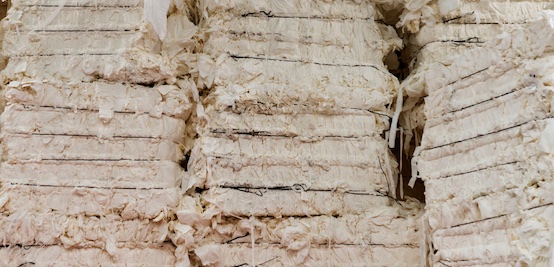#Market Analysis & Forecasts
Global sustainable clothing market outlook: Rapidly increasing textile waste to drive the market through 2026
According to the world bank, the fashion sector is responsible for 10% of global carbon emissions, which exceeds the combined emissions from international flights & maritime shipping. At this pace, the sector's greenhouse gas emissions will rise more than 50% by 2030. Hence, with these surging carbon emissions, the demand for eco-friendly materials is expected to significantly increase, which, in turn, would boost the market during 2021-26.
Moreover, the mounting penetration of social media results in increased awareness regarding the environmental impacts of the clothing industry, which shall also augment the market growth during the forecast years, further states the research report, Global Sustainable Clothing Market Analysis, 2021.
COVID-19 Outbreak Significantly Impacted the Global Sustainable Clothing Market
• Last year, the COVID-19 pandemic and the resulting economic shutdowns generated unprecedented challenges for the clothing industry, including reduced consumer spending & disrupted supply chains.
• The pandemic affected the Global Sustainable Clothing Market, mainly due to international trade restrictions, disruptions in supply chain & logistics, order cancellations, and suddenly diminishing demand.
• However, the growing environmental awareness encouraging many consumers to switch to more sustainable & greener clothing choices shall positively impact the fashion sector.
• Moreover, sustainability is the new trend & more consumers are demanding it. For instance, according to a story posted on the UN's Environment Program website in June, the designer Nimco Adam, 'Queen of Tie-Dye,' realized during the pandemic that chemical dyes had severely impacted her health & the environment. It made her decide to make sustainability a part of her work ethic & life.
• Similarly, this awareness has influenced many consumers & businesses to opt for sustainable lifestyles.
Market Segmentation
By Material:
Of them all, the demand for Cruelty-Free Leather clothing is projected to witness significant rise during 2021-26. The imposition of stringent regulations regarding animal rights and the growing customer inclination toward animal-free products are driving the segment cited above.
Moreover, the rising awareness regarding vegan leather, surging funding in plant-based leather producing companies, and the ban on using leather derived from animals like crocodiles, snakes, and kangaroos by the fashion brands are other crucial factors expected to boost the segment. For instance: Beyond Leather Materials, a company that produces plant-based & eco-friendly alternatives to animal leather, raised a seed investment fund of USD1.31 million in 2020 to advance its production facilities.
Moreover, the climate neutrality targets set by the companies to surge vegan range for leather entwined with the launch of plant-based leather shall further lead Cruelty-Free Leather clothes to gain significant popularity during 2021-26. In 2020, Adidas 'renounced' animal fur and aims to achieve global climate neutrality by 2050.
By Product:
Recycled Products is Increasing Significantly in the Global Sustainable Clothing Market
The burgeoning textile waste in landfills creating a significant impact on the environment is the prime factor surging the demand for Recycled Products globally. It is estimated that 21 Billion tons of textile waste are sent to landfills annually due to a lack of recycling.
Also, around 87% of the total fabric input used in clothing gets disposed of without recycling to landfills, and it creates a severe impact on the environment. Moreover, the companies are using recycled materials like polyester as it requires less energy to produce initial polyester and reduced dependence on fossil fuel.
Regional Landscape:
Europe to Acquire Largest Share in the Global Sustainable Clothing Market During 2021-26
The surging buying power of consumers owing to the mounting textile waste due to declining prices of clothes, increasing inclination toward e-commerce, and mounting consumer awareness regarding sustainable fashion are the prime factors expected to expand the market size in Europe.
Moreover, the strong presence of prominent fashion brands like Zara, H&M, Finisterre, & Mango in the region influencing consumers to adopt sustainable clothing through their various sustainability goals like using 100% sustainable fabric, the launch of ethical brands, and various recycling schemes shall further boost the regional market in the coming years.
In 2019, Zara announced to make all of its clothes with 100% sustainable fabrics like cotton & linen before 2025. Likewise, in 2021, H&M launched a new sustainability concept by debuting sustainable fabrication.
Market Dynamics
Rapidly Increasing Textile Waste to Drive the Market Through 2026
The garment industry is one of the most polluting sectors in the world. Therefore, many apparel manufacturers & consumers are shifting toward sustainable clothes. According to the United Nations Environment Program (UNEP), of the total fiber input used for clothing, 87 % is burnt or disposed of in a landfill. Further, most of the fabric gets manufactured using crude oil, which leads to the release of a large volume of plastic microfibers into lakes & the ocean.
Possible Challenges
Lack of Standardization Might Restrain the Market Size During 2021-26
The surge in the vague sustainability claims by several brands is resulting in a declining trust among the potential customers. Additionally, companies are adopting greenwashing marketing strategy to assure consumers that their products are environmentally friendly and forge an ecologically responsible image.
Lack of knowledge among consumers regarding the environment & social concerns associated with fashion is another factor that might limit the market to grow during 2021-26.
Companies Mentioned
• Finisterre
• Patagonia
• Pact Clothing
• Everlane
• Able
• Tentree
• Boden
• Kotn
• Alternative Apparel
• Ref Jeans by Reformation
For more information about this report visit:
https://www.researchandmarkets.com/r/mqu21w















